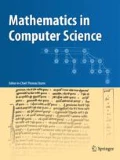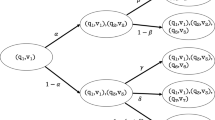Abstract
Floating-point arithmetic precision is limited in length the IEEE single (respectively double) precision format is 32-bit (respectively 64-bit) long. Extended precision formats can be up to 128-bit long. However some problems require a longer floating-point format, because of round-off errors. Such problems are usually solved in arbitrary precision, but round-off errors still occur and must be controlled. Interval arithmetic has been implemented in arbitrary precision, for instance in the MPFI library. Interval arithmetic provides guaranteed results, but it is not well suited for the validation of huge applications. The CADNA library estimates round-off error propagation using stochastic arithmetic. CADNA has enabled the numerical validation of real-life applications, but it can be used in single precision or in double precision only. In this paper, we present a library called SAM (Stochastic Arithmetic in Multiprecision). It is a multiprecision extension of the classic CADNA library. In SAM (as in CADNA), the arithmetic and relational operators are overloaded in order to be able to deal with stochastic numbers. As a consequence, the use of SAM in a scientific code needs only few modifications. This new library SAM makes it possible to dynamically control the numerical methods used and more particularly to determine the optimal number of iterations in an iterative process. We present some applications of SAM in the numerical validation of chaotic systems modeled by the logistic map.
Similar content being viewed by others
References
Li X.S., Demmel J.W., Bailey D.H., Henry G., Hida Y., Iskandar J., Kahan W., Kang S.Y., Kapur A., Martin M.C., Thompson B.J., Tung T., Yoo D.J.: Design, implementation and testing of extended and mixed precision BLAS. ACM Trans. Math. Softw. 28(2), 152–205 (2002)
Fousse, L., Hanrot, G., Lefèvre, V., Pélissier, P., Zimmermann, P.: MPFR: A multiple-precision binary floating-point library with correct rounding. ACM Trans. Math. Softw. 33(2), 13:1–13:15 (2007). (http://www.mpfr.org)
Wilkinson J.H.: Rounding errors in algebraic processes. Prentice-Hall Inc., Englewood Cliffs (1963)
Higham N.J.: Accuracy and stability of numerical algorithms. 2nd edn. Society for Industrial and Applied Mathematics (SIAM), Philadelphia (2002)
Einarsson B. et al.: Accuracy and Reliability in Scientific Computing. Software-Environments-Tools. SIAM, Philadelphia (2005)
Chaitin-Chatelin F., Frayssé V.: Lectures on Finite Precision Computations. Society for Industrial and Applied Mathematics, Philadelphia (1996)
Moore R.: Interval analysis. Prentice Hall, Saddle River (1966)
Alefeld G., Herzberger J.: Introduction to interval analysis. Academic Press, New York (1983)
Moore R., Kearfott R., Cloud M.: Introduction to interval analysis. Society for Industrial and Applied Mathematics, Philadelphia (2009)
Chesneaux J.M.: L’arithmétique stochastique et le logiciel CADNA. Habilitation à diriger des recherches Université Pierre et Marie Curie, Paris (1995)
Vignes J.: A stochastic arithmetic for reliable scientific computation. Math. Comput. Simul. 35, 233–261 (1993)
Goubault, E., Putot, S., Baufreton, P., Gassino, J.: Static analysis of the accuracy in control systems: Principles and experiments. In: Proceedings of Formal Methods in Industrial Critical Systems, LNCS 4916, Springer, Berlin (2007)
Chesneaux, J.M., Graillat, S., Jézéquel, F.: Rounding Errors. In: Encyclopedia of Computer Science and Engineering, vol. 4, pp. 2480–2494. Wiley, New York (2009)
Revol, N., Rouillier, F.: MPFI (Multiple Precision Floating-point Interval library) (2009). (Available at http://gforge.inria.fr/projects/mpfi).
Bailey D.H.: A Fortran 90-based multiprecision system. ACM Trans. Math. Softw. 21(4), 379–387 (1995)
Brent R.P.: A fortran multiple-precision arithmetic package. ACM Trans. Math. Softw. 4(1), 57–70 (1978)
Priest, D.M.: Algorithms for arbitrary precision floating point arithmetic. In Kornerup, P., Matula, D.W., (eds.) Proceedings of the 10th IEEE Symposium on Computer Arithmetic (Arith-10), Grenoble, France, pp. 132–144. IEEE Computer Society Press, Los Alamitos (1991)
Shewchuk J.R.: Adaptive precision floating-point arithmetic and fast robust geometric predicates. Discret. Comput. Geom. 18(3), 305–363 (1997)
Bailey, D.H.: A Fortran-90 double-double library (2001). (Available at http://crd.lbl.gov/~dhbailey/mpdist/index.html)
Hida, Y., Li, X.S., Bailey, D.H.: Algorithms for quad-double precision floating point arithmetic. In: Proceedings of 15th IEEE Symposium on Computer Arithmetic, pp. 155–162. IEEE Computer Society Press, Los Alamitos (2001)
IEEE Computer Society, New York: IEEE Standard for Binary Floating-Point Arithmetic, ANSI/IEEE Standard, pp. 754–1985 (1985). (Reprinted in SIGPLAN Notices 22(2), 9–25 (1987))
Grandlund, T.: GNU MP: The GNU Multiple Precision Arithmetic Library. (http://gmplib.org)
Kulisch U.: Advanced Arithmetic for the Digital Computer. Springer, Wien (2002)
Chesneaux J.M.: Study of the computing accuracy by using probabilistic approach. In: Ullrich, C. (eds) Contribution to Computer Arithmetic and Self-Validating Numerical Methods, pp. 19–30. IMACS, New Brunswick (1990)
Chesneaux J.M., Vignes J.: Sur la robustesse de la méthode CESTAC. C. R. Acad. Sci. Paris Sér. I Math. 307, 855–860 (1988)
Vignes J.: Zéro mathématique et zéro informatique. C. R. Acad. Sci. Paris Sér. I Math 303, 997–1000 (1986)
Vignes J.: Zéro mathématique et zéro informatique. La Vie des Sciences 4(1), 1–13 (1987)
Université Pierre et Marie Curie, Paris, F.: CADNA: Control of Accuracy and Debugging for Numerical Applications. (http://www.lip6.fr/cadna)
Jézéquel F., Chesneaux J.M.: CADNA: a library for estimating round-off error propagation. Comput. Phys. Commun. 178(12), 933–955 (2008)
Jézéquel F., Chesneaux J.M., Lamotte J.L.: A new version of the CADNA library for estimating round-off error propagation in Fortran programs. Comput. Phys. Commun. 181(11), 1927–1928 (2010)
Lamotte J.L., Chesneaux J.M., Jézéquel F.: CADNA_C: A version of CADNA for use with C or C++ programs. Comput. Phys. Commun. 181(11), 1925–1926 (2010)
Chesneaux J.M., Troff B.: Computational stability study using the CADNA software applied to the Navier-Stokes solver PEGASE. In: Alefeld, G., Frommer, A. (eds) Scientific Computing and Validated Numerics, pp. 84–90. Akademie, Berlin (1996)
Alberstein N., Chesneaux J.M., Christiansen S., Wirgin A.: Comparison of four software packages applied to a scattering problem. Math. Comput. Simul. 48, 307–318 (1999)
Jézéquel F., Rico F., Chesneaux J.M., Charikhi M.: Reliable computation of a multiple integral involved in the neutron star theory. Math. Comput. Simul. 71(1), 44–61 (2006)
Scott N., Jézéquel F., Denis C., Chesneaux J.M.: Numerical ’health check’ for scientific codes: the CADNA approach. Comput. Phys. Commun. 176(8), 507–521 (2007)
Scott N., Faro-Maza V., Scott M., Harmer T., Chesneaux J.M., Denis C., Jézéquel F.: E-collisions using e-science. Phys. Part. Nuclei Lett. 5(3), 150–156 (2008)
Rump S.: Reliability in Computing. The Role of Interval Methods in Scientific Computing. Academic Press, Oakville (1988)
Muller J.M.: Arithmétique des Ordinateurs. Academic Press, Masson (1989)
Chesneaux J.M., Jézéquel F.: Dynamical control of computations using the trapezoidal and Simpson’s rules. J. Univers. Comput. Sci. 4(1), 2–10 (1998)
Jézéquel F.: Dynamical control of converging sequences computation. Appl. Numer. Math. 50(2), 147–164 (2004)
Jézéquel F., Chesneaux J.M.: Computation of an infinite integral using Romberg’s method. Num. Algo. 36(3), 265–283 (2004)
Jézéquel F.: A dynamical strategy for approximation methods. C. R. Acad. Sci. Paris Mécanique 334, 362–367 (2006)
Ahmed Z.: Definitely an integral. Am Math. Month. 109(7), 670–671 (2002)
Bailey, D., Li, X.: A comparison of three high-precision quadrature schemes. In: Proceedings of 5th Real Numbers and Computers conference, Lyon, France, pp. 81–95 (2003)
Devaney R.L.: An introduction to chaotic dynamical systems. Second edn. Addison-Wesley Studies in Nonlinearity, Addison-Wesley Publishing Company Advanced Book Program, Redwood City (1989)
Argyris J., Faust G., Haase M.: An exploration of chaos. Texts on Computational Mechanics, vol. VII. North-Holland Publishing Co., Amsterdam (1994)
Tucker W.: The Lorenz attractor exists. C. R. Acad. Sci. Paris Sér. I Math. 328(12), 1197–1202 (1999)
Galias, Z., Tucker, W.: Rigorous study of short periodic orbits for the Lorenz system. In: Proceedings of IEEE International Symposium on Circuits and Systems, pp. 764–767. ISCAS’08, Seattle (2008)
Tucker, W.: Fundamentals of chaos. In: Kocarev, L., et al. (eds.) Intelligent computing based on chaos. Studies in Computational Intelligence, vol. 184, pp. 1–23. Springer, Berlin (2009)
Pichat, M., Vignes, J.: The numerical study of chaotic systems—future and past. In: 16th IMACS World Congress on Scientific Computation, Applied Mathematics and Simulation. Lausanne, Switzerland (2000)
Yao L.S.: Computed chaos or numerical errors. Nonlinear Anal. Model. Contr. 15(1), 109–126 (2010)
Author information
Authors and Affiliations
Corresponding author
Additional information
This work has partially been carried out during S. Wang’s and Y. Zhu’s training periods at LIP6.
Rights and permissions
About this article
Cite this article
Graillat, S., Jézéquel, F., Wang, S. et al. Stochastic Arithmetic in Multiprecision. Math.Comput.Sci. 5, 359–375 (2011). https://doi.org/10.1007/s11786-011-0103-4
Received:
Revised:
Accepted:
Published:
Issue Date:
DOI: https://doi.org/10.1007/s11786-011-0103-4




